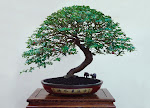 Disaster: Almost all the shops on the main road burned down.
Disaster: Almost all the shops on the main road burned down. Ablaze: The disastrous fire of June 1966
Ablaze: The disastrous fire of June 1966 RESPECTED FIGURE: My dad with a bevy of trainee nurses.
RESPECTED FIGURE: My dad with a bevy of trainee nurses.New Straits Times, Monday, July 28, 2008
Peggy Loh
IN Geography class, I learnt that the Maasai were an East African tribe that drank cow’s blood mixed with milk.
Peggy Loh
IN Geography class, I learnt that the Maasai were an East African tribe that drank cow’s blood mixed with milk.
So when my parents had a job transfer to Masai, I was confused. At first, I thought they were posted to East Africa but after listening to the many discussions, I realised that it was a small town about 25km away from Johor Baru.
An hour’s drive on a winding road fringed by rubber trees took us past a police station into Masai. On the same side of the road, there was a Chinese cemetery with the post office next to it and a movie theatre opposite. I’ve never been to an open-air theatre but had heard that the seats were usually infested with bugs.
At that time, Masai had one main street bordered by rows of dilapidated shops with corrugated zinc roofs that looked like a wild-west cowboy town.
We moved into the staff quarters No. 2174 Jalan Sekolah, in the government health centre compound and it was our home for 13 years until my father retired in 1977.
On that same road was the penghulu or village headman’s house with the balai raya or community hall opposite. A Tamil primary school was located directly opposite our house so the road was always busy and noisy unless it was a weekend or school holidays.
My sisters and I used to commute to school in Johor Baru and had to wake up very early each morning to be ready for our school bus. Later, we moved to stay with our grandparents in Johor Baru for several years. In upper secondary, we moved back to Masai and used public buses to get to school.
My friends, great fans of the Bee Gees who knew that I lived in Masai, wittily joked that I was going back to Masai-chusetts. Meanwhile, our family became part of the Masai community. Mum was known as “Meesee”, a corrupted form of “Missy” in local jargon for female nurses.
For a long time, I didn’t understand the word that local Chinese people used to address my dad.
It sounded like, “Lesa” but I figured it was neither Chinese nor Malay language. Puzzled, I quizzed my dad and finally found out that it was English and the word meant “Dresser” because one of dad’s duties was to dress wounds.
When my siblings and I ventured into town, someone would inevitably recognise us and whisper that we were, “Anak Meesee”.
Being easily recognisable had its privileges especially when we dealt with shop merchants and taxi drivers. Now that our parents have retired to Johor Baru, people of Masai who meet us again after all these years, would still refer to us as, “Meesee kai kia”.
Two incidents hold vivid memories even though they were not first-hand experiences as we were kids and were often safely sheltered at home.
These incidents were proof of Masai people’s solidarity and their resilience to cope with calamities.
In June 1966, fire razed almost all the shops on Masai’s main street.
Dad rushed to help retrieve belongings and among other things, he pulled out a heavy sewing machine. After the smoke cleared, it was rumoured that the fire was deliberately set because the town was due for redevelopment.
The fire indeed paved the way for rebuilding and soon Masai town had a new lease of life with a wider road and two rows of brick shophouses.
During the monsoon of 1968, floods inundated many low-lying areas and villagers were told to evacuate to community or school halls.
Several bridges were swept away and Masai was virtually cut-off from Johor Baru until a Bailey bridge was built as a temporary link.
A pregnant woman, who lived in a coconut grove, refused to leave her home until the flood water level rose almost to her neck. She was swept off by the strong current but instinctively wrapped her arms around a coconut tree, clinging on for dear life.
My dad was among the volunteers helping the villagers and he plunged in to rescue her. As dad was taking her to safety, the current was so strong that he had to grasp submerged grass to prevent them from drifting away.
He suddenly heard yells from a young man clinging to a tree further away so dad ran to town and managed to grab a rope off a window blind in a shop front.
He secured the rope to a tree and used it as a safety line to reach and rescue that young man. After the happy ending, we didn’t know what happened to the young man but the woman was so grateful that she offered her newborn son to my parents. Ask anyone in the bustling streets of Masai today and not many will remember the Masai of yesteryear but we have heaps of fond memories of our Masai-chusetts!





0 comments:
Post a Comment